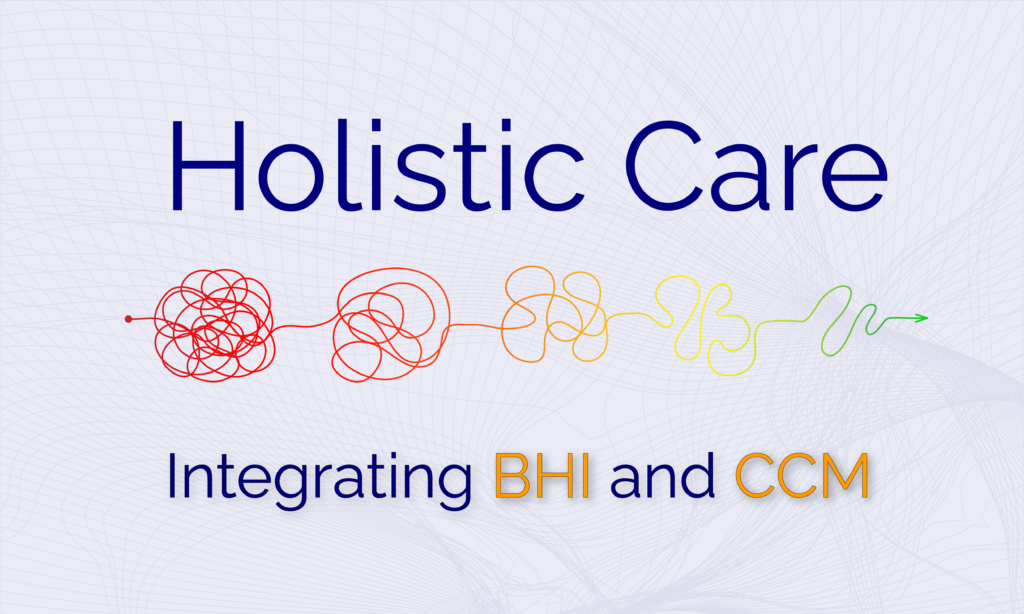Primary care providers often find themselves treating the physical ailments of their patients as well as their mental conditions. They know that a patient’s mental health and behavioral choices could significantly impact their overall health and well-being. For this reason, the medical community now looks toward a holistic approach to care delivery as a more effective strategy for producing positive health outcomes. This is especially true for elderly patients with chronic conditions who often suffer from depression or anxiety brought about by loneliness and isolation. To ensure patient success in reaching their healthcare goals, behavioral health care is often paired with chronic care.
With the advent of telehealth, providers now see an opportunity to provide access to even the remotest patient population and provide the care they need. Moreover, telehealth solutions enable close monitoring and accessible communication between clinicians and patients to immediately address a growing medical concern, whether it be a physical or mental problem. For instance, elderly patients need not feel so isolated because the technology is readily available to connect them with their care coordinators in just a few clicks. Though there is no replacement for actual human interaction, the option to make virtual consultations provide patients greater flexibility with their time, more savings otherwise spent on transportation, and a better quality of care that is readily available at any time and place.
BHI and CCM as Telehealth Solutions
Two prominent telehealth solutions are Chronic Care Management (CCM) and Remote Patient Monitoring (RPM). A lesser known service but equally important is Behavioral Health Integration (BHI).
CCM provides multiple touchpoints in-between office visits to ensure compliance with care instructions, including care coordination with other providers. RPM leverages digital technologies to capture real-time patient data for clinicians to ascertain patient health status and make the necessary intervention. Together, CCM and RPM are complementary services that offer value-based care.
BHI is also a care management service that involves creating an in-depth monthly behavioral health care plan to prevent behavioral health exacerbations. BHI has similar or overlapping activities with CCM and shares the same overarching goal of ensuring patient health and reducing costs from hospitalizations or readmissions. Hence, integrating BHI and CCM is the best approach to providing holistic chronic care.
BHI and CCM: Integration that Works
Together, BHI and CCM approach the patient’s illness from two major fronts, namely, with physical and behavioral or mental health interventions. The Center for Medicare and Medicaid Services (CMS) acknowledged the value of BHI with CCM and has incentivized both physicians and non-physician practitioners through separate payments for all their BHI services.
Recently, CMS has made adjustments to the Medicare Physician Fee Schedule (MPFS) policies to significantly improve reimbursements for these remote care services.
Moreover, integrating BHI and CCM bridges the gap that separates physical health from behavioral health. This integration can be a driver toward a better quality of care that focuses on prevention. BHI and CCM also address a rising concern in the medical community, which is the decline in the number of behavioral health practitioners. As virtual care solutions, BHI and CCM can leverage telecommunication technologies, provide instant connection, and enable physicians to cater to more patients with efficient scheduling that does not require a long queue and waiting hours typical of a traditional clinical setting.
Integrating BHI and CCM
Integrating BHI and CCM bring about the following benefits:
Boosts patient enrollment
A simple dialogue with patients can provide the education they need when it comes to behavioral and mental health, which often intersects with their chronic conditions. Most often, patients do not welcome discussions about their mental state but introducing BHI as a Medicare benefit has proven to be a good starting point. It also stresses that behavioral health is real and needs as much attention as their physical ailment. Only then can they achieve their healthcare goals when it comes to managing their conditions. BHI integrated into CCM could be the key to boosting patient enrollment.
Provides an added layer of expertise
Chronic conditions are rooted in lifestyle and poor behavioral choices can make the problem even bigger. With BHI, patients will be able to understand their conditions and can address them. In many instances, patients are more comfortable talking to their physicians instead of a therapist. In this setting, BHI has created the support and the access patients need to manage their conditions from dual fronts. Moreover, integrating BHI into CCM adds another layer of expertise to primary care practice in optimizing remote patient care by collaborating with a behavioral health practitioner.
Efficiently allocates CCM resources
CCM also manages depression, anxiety, or obsessive-compulsive disorder because they are considered chronic conditions. True, CCM is often associated with physical ailments like diabetes, COPD, and arthritis, to just name a few, so it does not seem fair to just lump mental health problems into one general category. With BHI, CCM will be able to provide specialized care and facilitate relevant discussion about the reality that patients are dealing with. Patients will benefit from the integration of BHI and CCM because it enables physicians to isolate specific mental health concerns and take the appropriate action to treat them. In addition, for physicians, pairing BHI and CCM efficiently allocates resources and responsibilities.
Adds more reimbursement-enhanced income
BHI can be paired with CCM in boosting revenues. Both BHI and CCM generate reimbursements for 20 minutes of non-face-to-face services per patient. Adding them up almost doubles the income generated per month, providing primary care physicians with a much-needed income to stay independent while taking the initiative to innovate their delivery of care.
BHI and CCM together make sense, but these care management services require substantial investment and resources. For one, BHI and CCM rely on strong coordination between providers, care coordinators, and the patient. This communication could easily get bogged down and will affect the continuity of care. Crucial in the delivery of BHI is to ensure seamless coordination, particularly in creating the care plan, making the reports, and identifying red flags.
Ascent Care Partners (ACP) provides turnkey CCM and RPM solutions with BHI as a supplementary service. Our care coaches are specially trained to engage patients and foster meaningful relationships that allow them to work on the physical and mental well-being of their patients. As a full service, ACP will provide everything that a practice needs, bringing you revenues that flow directly to your bottom line without an upfront cost, risk, increased overhead, or capital investment.



